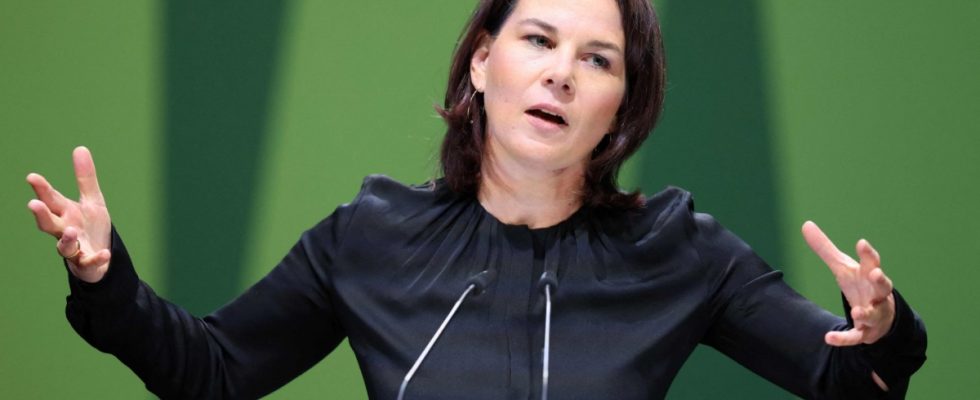Nobody who wants to go to the Greens party conference in Bad Vilbel can avoid Timmo Scherenberg’s warning on Saturday. “Human rights know no borders”, see his bright red banner. The head of the Hessian Refugee Council has set up a bright red protest stand with organizations such as Pro Asyl and Diakonie directly at the entrance to the congress center.
Earlier, says Scherenberg, the Greens would have stood with them on the street. Over. “An absurdity,” he says, about the compromise on European asylum reform supported by leading Green Party politicians. Scherenberg is here because he hopes that the Greens will turn around and that there will be resistance within the Greens at their own party conference. “The cheese hasn’t been eaten yet,” says Scherenberg.
The protest will not only take place in front of the hall this Saturday. An agitated party also meets inside. “We can see how much this debate is tearing us apart,” Foreign Minister Annalena Baerbock admitted in a speech that afternoon. “It tore me up too.” Despite doubts, she agreed to the EU reform to prevent progress in other areas of migration policy from failing, such as a distribution mechanism for refugees.
The fact that Baerbock agreed to a tightening of European asylum law, even though the Greens in the traffic light coalition had actually called for much larger exceptions to these rules, has caused a lot of anger in the party in the past few days. There was talk of “shame” and “abuse of power” among leading politicians.
It became clear at the start of the party congress in Hesse how deep the rifts had become in the party’s asylum policy. Only with a delay of almost an hour was Green Party managing director Emily Büning able to open the meeting at noon. In the back rooms of the Bad Vilbel Congress Center, the party leadership tried desperately to the end to dissuade critics of the asylum policy from a hard confrontation. At first without much success. With counter-motions, the Green Youth and representatives of the party left wanted to force the party leadership to renegotiate in Brussels.
“Pressure from all sides”
Economics Minister Robert Habeck spoke to the party’s conscience at the beginning of the meeting. The criticism of the Greens shows what is at stake. “There is pressure on us from all sides. It must not follow from this that we become more confrontational,” warns Habeck and warns of a renewed dispute over direction. “Have no longing for a minority position, have no longing for opposition. That would be failure in the historic task that has been given to us.” The Greens shouldn’t allow themselves to be pushed into a niche and need majority positions, especially when it comes to the new heating law or the asylum reform.
Tarek Al-Wazir, the Green prime minister candidate for the Hessian state elections in autumn, is also calling for an end to the internal disputes. A directional dispute in the election campaign is extremely inconvenient for him. Sticking your head in the sand doesn’t solve a problem, says Al-Wazir. “Government also means making difficult decisions.”
For many Greens, however, decisions on asylum policy are too difficult. Aminata Touré, Thuringia’s integration minister, explains that she thinks the tightening of the asylum law is “wrong”. Next: “You disappoint me.” The Greens would have to stand up for the protection of the refugees. It is painful that her own party has also agreed to a tightening of asylum law in Germany with the compromise at European level. The Greens have a great responsibility, for example for the protection of children in the asylum process, says Dennis Helmich, the state chairman of Saxony-Anhalt. They should not subordinate government responsibility to that either.
The dispute over asylum policy is being fought so hard by the Greens because it touches a core of the party. Tens of thousands of new members have joined the Greens since 2015 because they support refugees. After the federal government’s approval, many “no longer understand the world,” says Bundestag member Sven-Christian Kindler.
In the afternoon it was unclear whether there would be an agreement and thus a joint resolution at the party conference. The party was initially unable to agree on a common line in the debate. However, it became apparent that the party leadership could agree to changes to its own lead motion on asylum policy. If the critics prevail and the party congress votes for improvements to the asylum compromise, this would also pose problems for the traffic light coalition. Because improvements to the EU asylum reform are considered to be hardly enforceable.

